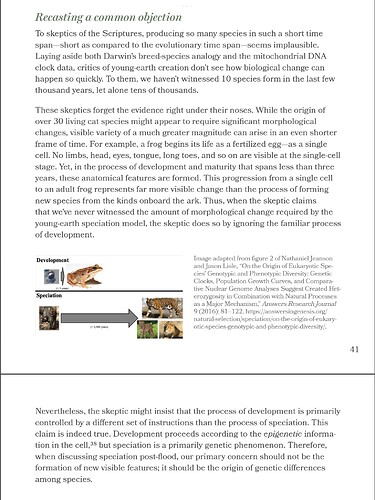Consider the breadth of all of the research published on evolution and biology. There are libraries upon libraries of technical literature, compared to the single bookshelf or so of creationist and ID published work. If you take that sheer amount of writing into account, mainstream biologists agree exceptionally well, especially compared to creationists.
Further, creationists have a conclusion that they all already agree on (genesis). Considering that biologists start with data and experiments and come to conclusions based on what they observe, the fact that they agree at all is a testament that the scientific method produces consistent, verifiable results.
Creationists’ explanations of evolution make much more sense. The irony of that doesn’t escape me.
I would strongly disagree. Creationists’ explanations of evolution vary based on the argument they are making. For example, AiG has defined microevolution:
As adaption within an organism’s lifetime:
“this is a small-scale change allowing an organism to adapt to its environment…”
As expression of dominant and recessive traits:
“Microevolution” is a term representing small changes in living things (for example a difference in hair color or height from a previous generation),”
As changes within a species:
“Evolution can be used in the sense of change in a species by natural selection.”
And, as change within baramin kinds like you suggest.
”Where is a paper that show the origins of the new kinds?”
When you include organizations besides AiG, and individual creationists, the variety of opinions is even more wild. This kind of inconsistency seems to shift based on who is writing which argument, and is an atrocious explanation of the actual science.
The only place “evolutionists” have a point is when showing novel traits show up in very simple organisms.
Is this not a strong point, though? In animals with short enough generation times to be observed over an evolutionary significant time period, we observe novel traits arising. Simple organisms are governed by the same genetic principles as more complex organisms, right?
That’s where YEC has an advantage over ID again IMO. I do think there’s control mechanisms that haven’t been discovered yet. ID tends to over-argue about broken genes.
For what it’s worth, I totally agree with you here. I think if baramin kinds cannot adapt into each other and new information cannot arise as YECs predict, creationists have a huge opportunity to discover and define the genetic barriers between kinds and the control mechanisms in place. I think that every scientist on this site would agree with me that a confirmed prediction of that nature would revolutionize biology.
I do find it strange that no creationists anywhere are looking for those genetic mechanisms, though, and that no geneticist have stumbled across them. Indeed, most creationists seem to just sweep genetics underAdd images
the rug. Maybe they know that there are know real mechanisms to discover?


